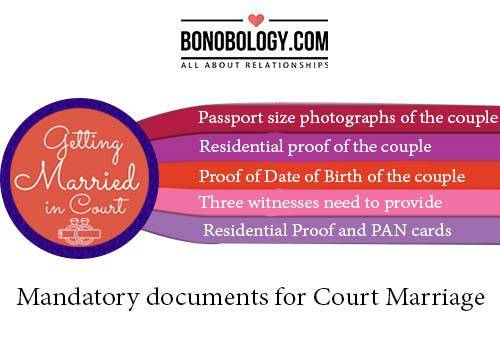Court marriages in India
The good news is that the overall process of court marriages in India after 2006 has become less strenuous. This is because the Judiciary wants to encourage registration of marriages in the whole of India and for all its citizens, irrespective of their religion and personal law and without any exceptions or exemptions.
Court Marriage: What it means
The term ‘Marriage Registration’ is often confused with the term ‘Court Marriage’. Although court marriage is a form of marriage registration, they both have different meanings. While in the first scenario you are merely ‘Registering’ an already solemnised marriage, in the latter, you are actually getting married in the presence of the Registrar of Marriages. According to Part 6 of the Civil Registration Act 2004, the registration procedure for marriage is now the same in all Indian states. You may belong to the same religion or two different religions. It does not affect the process of court marriage under the Special Marriage Act, 1954. A court marriage is a civil contract and hence requires no rites or ceremonies. Indian laws still do not allow same-sex marriages. So, the marriage can take place only between a male and a female. The couple can directly apply to the Marriage Registrar for registering and getting married, followed by applying for the marriage certificate, only after they fulfil the necessary conditions.
Court Marriage: How to apply to get married in court
(Source)
The couple has to file a Notice of Intended Marriage date in the specified form to the Marriage Registrar of the district in which either of them has resided for a period of not less than 30 days from the notice period.A general notice is pasted on the notice board of the Marriage Registrar’s office, inviting objections, if any.If there is no objection after 30 days, the marriage may be solemnised at the Marriage Registrar’s Office.The couple, along with three witnesses, is required to be present on the date is given by the Registrar for registering the marriage.
All the forms required for the application of court marriage are easily available online, and some registrars even offer online application for an intended court marriage. However, the couple and the three witnesses have to be physically present on the day assigned by the registrar for the court marriage.
Mandatory documents for Court Marriage
Application form (available online) in the prescribed format and feesPassport size photographs of the coupleResidential proof of the coupleProof of Date of Birth of the coupleThree witnesses need to provide Residential Proof and PAN cardsDeath certificate or divorce decrees, whichever is applicable, in case of a previous marriage of any one of the partners
Before the Registrar solemnises the marriage, the couple and the three witnesses must sign a declaration in front of a marriage officer, who will also sign the document. Later, the marriage officer will enter the certificate in the Marriage Certificate Book. The entry of the certificate in the book is deemed conclusive evidence of a lawful marriage. Any marriage in India can be registered under this Act. The parties must jointly apply for the marriage registration. After 30 days of notice to the public, the marriage officer will enter the certificate into the Marriage Certificate Book. The spouses and three witnesses must sign the certificate. In case a marriage between an Indian and a foreign national is to take place, they have to file a notice of intended marriage with a Marriage Registrar where the Indian partner resides. That notice is required to be published for the stipulated 30 days. At the end of the 30 days, the Marriage Registrar is free to perform the marriage.
Court Marriage: What might be a problem?
Love birds who want to have a happily-ever-after the filmy way may find one probable hitch associated with a court marriage, and that is “how to keep their wedding a secret?” The secret can be exposed because of the notice of intended marriage, the publication of the notice of the marriage and the notice for address verification sent to the respective families. Even the police station falling in the jurisdiction is at times sent a copy of the notice of the intended marriage. All the entries at the registrar can be obtained very easily by anyone any time, thus revealing their marital status. However, this issue was properly dealt with in the Delhi High Court judgement delivered by Justice S Ravindra Bhat in Pranav Kumar Mishra V. Govt of NCT of Delhi, stating the right to privacy and hence no need to inform the parents about the court marriage. To avoid any such glitches, many couples are attracted to Arya Samaj marriages. Those couples who wish to keep their marriage a secret until they get their valid marriage certificate, first get married through Arya Samaj rituals and then register with the Registrar of Marriages. Some of them even provide all the legal aid required.
An alternative to court marriage is the Arya Samaj marriage
Some questions that people ask about this form of marriage are: The Arya Samaj Mandir has been conducting marriages for over 150 years all over India. Marrying through the Arya Samaj is the fastest and most cost-effective, especially if both of the partners are Hindu, Buddhists, Jains or Sikhs.
Arya Samaj marriage certificate validity
The ceremony of an Arya Samaj marriage is conducted as per the Vedic ritual, and valid under the Arya Samaj Marriage Validation Act, 1937 with provisions of the Hindu Marriage Act, 1955. Unlike Court marriage where you need to apply 30 days prior to getting married, an Arya Samaj marriage takes around 1-2 hours for completion. However, the Arya Samaj has both ‘social’ and ‘legal’ responsibilities to check the validity of the alliance. Once the fees and forms are fully furnished and accepted, the Arya Samaj ceremony is performed on a first-come-first-served basis after a 48-hour wait period for any changes, depending on the availability of the priest.
Eligibility for an Arya Samaj marriage
The groom must be 21 and the bride 18 years old at the time of the registrationInter-caste marriages and inter-religious marriages are also performed in Arya Samaj rules, provided none of the marrying partners is Muslim, Christian, Parsi or Jewish. Persons of these religions can convert through a process called Shuddhi
Documents required for an Arya Samaj marriage
Four colour photographs each of the bride and groomProof of date of birth and residence of bothTwo witnessesDeath certificate or divorce decrees, whichever is applicable, in case of a previous marriage of any one of the partnersWhen one of the pair is a foreign citizen or holding a foreign passport or a foreign residential address, a Certificate of the present marital status of the party/No Impediment Certificate/NOC from the concerned Embassy and a valid visa
Within five to ten working days after a wedding ceremony is over, the Arya Samaj will issue a Marriage Certificate which can be produced at the Registrar of Marriage for issuance of a legal certificate. The Arya Samaj Mandir provides legal assistance in its premises as well as online. For a very nominal fee, the volunteers of Arya Samaj can handle all your paperwork from application for the marriage to the registration of the marriage in the registrar. The Arya Samaj marriage document is a legal document inside India but it is not valid outside the country. To get a visa you need a marriage document issued by the marriage registrar of the Government of India. But on the basis of Arya Samaj marriage certificate, one can get a marriage certificate of Government also.
Sneha and Omkar’s no-fuss court marriage
Sneha was from Kerala and her boyfriend Omkar was from Jharkhand. They fell in love in Goa and decided to have a court marriage in Goa, followed by a traditional wedding ceremony in Kerala. Since both Sneha and Omkar completed their schooling and college from Goa, getting a bonafide certificate for residential proof was no problem. All they had to do was get an affidavit from the notary stating their intention of marriage, along with the application for court marriage. They had to submit this and the respective age and residence documents along with identity and residence documents of the three witnesses. They submitted this on the 3rd of September and were given the date of 30th September for the court marriage. On the 30th September, Sneha arrived with her family and Omkar arrived with his friends (his family was against the marriage). When the peon called their names, they went and signed the register along with the witnesses and the registrar of marriage. They did not exchange garlands, just distributed sweets. They were asked to collect the marriage certificate within a week.


